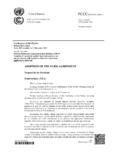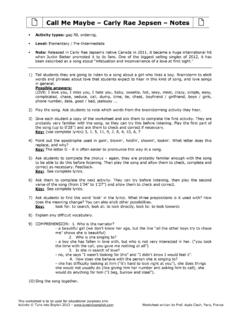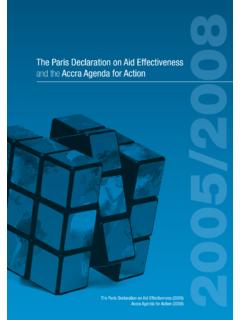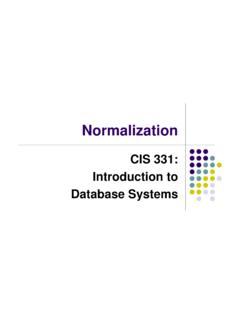Transcription of OECD Better Life Index
1 Under embargo until 28 May 10:00 ( paris time) OECD Better life Index Country Reports Contents page Australia 3 Austria 6 Belgium 9 Brazil 12 Canada 15 Chile 18 The Czech Republic 21 Denmark 24 Estonia 27 Finland 30 France
2 33 Germany 36 Greece 39 Hungary 42 Iceland 45 Ireland 48 Israel 51 Italy 54 Japan 57 Luxembourg 60 Mexico 63 The Netherlands 66 New Zealand 69 Norway 72 Poland 75 Portugal 78 The Russian Federation 81 The Slovak Republic 84 Slovenia 87 South Korea 90 Spain 93 Sweden 96 Switzerland 99 Turkey 102 The United Kingdom 105 The United States of America 108 Under embargo until 28 May 10:00 ( paris time) OECD Better life Index Australia For questions and more information contact: Lorena Sanchez Tel: 33 (0) 1 45 24 79 91 HOW S life IN AUSTRALIA?
3 Australia performs exceptionally well in measures of well-being, as shown by the fact that it ranks among the top countries in a large number of topics in the Better life Index (Figure 1). Income: In Australia, the average household net-adjusted disposable income is 28 884 USD a year, more than the OECD average of 23 047 USD a year. But there is a considerable gap between the richest and poorest the top 20% of the population earn six times as much as the bottom 20%. Jobs: In terms of employment, over 73% of people aged 15 to 64 in Australia have a paid job, above the OECD employment average of 66%.
4 Some 79% of men are in paid work, compared with 67% of women. People in Australia work 1 693 hours a year, less than most people in the OECD who work 1 776 hours. Almost 14% of employees work very long hours, much higher than the OECD average of 9%, with 21% of men working very long hours compared with just 6% for women. Education: In Australia, 73% of adults aged 25-64 have earned the equivalent of a high-school degree, close to the OECD average of 74%. This is truer of men than women, as 76% of men have successfully completed high-school compared with 71% of women.
5 This difference is higher than the OECD average and suggests women s participation in higher education could be strengthened. Australia is nonetheless a top-performing country in terms of the quality of its educational system. The average student scored 519 in reading literacy, maths and science in the OECD s Programme for International Student Assessment (PISA). This score is higher than the OECD average of 497, making Australia one of the strongest OECD countries in students skills. On average in Australia, girls outperformed boys by 9 points, in line with the average OECD gap.
6 Health and Environment: In terms of health, life expectancy at birth in Australia is almost 82 years, two years higher than the OECD average of 80 years. life expectancy for women is 84 years, compared with 80 for men. The level of atmospheric PM10 tiny air pollutant particles small enough to enter and cause damage to the lungs is 14 micrograms per cubic meter, considerably lower than the OECD average of 21 micrograms per cubic meter. Australia also does well in terms of water quality, as 91% of people say they are satisfied with the quality of their water, higher than the OECD average of 84%.
7 Community and public engagement: Concerning the public sphere, there is a strong sense of community and high levels of civic participation in Australia, where 94% of people believe that they know someone they could rely on in time of need, higher than the OECD average of 90%. Voter turnout, a measure of public trust in government and of citizens' participation in the political process, was 93% during recent elections; this figure is the highest in the OECD where the average is 72%. There is little difference in voting levels across society; voter turnout for the top 20% of the population is 94% and for the bottom 20% it is 92%, a much narrower difference than the OECD average gap of 12 percentage points and suggesting there is broad social inclusion in Australia s democratic institutions.
8 life satisfaction: In general, Australians are more satisfied with their lives than the OECD average, with 84% of people saying they have more positive experiences in an average day than negative ones. This figure is higher than the OECD average of 80%. For more information see: Figure 1: Topic rankings for Australia OECD Better life Index (BLI): USER FINDINGS FOR AUSTRALIA Australia is currently 6th in number of visits with over 75,800 visits and represents 4% of total user base. The top cities or regions in numbers of visits are Sydney, Melbourne, Brisbane and Adelaide.
9 Health, life Satisfaction and Education are the three highest ranked topics by Australia-based users. This is based on 1,088 indexes received from Australia-based 1 Out of 24,167 user indexes collected between May 2011 and May 2013. User feedback is not necessarily representative for the population at large. Under embargo until 28 May 10:00 ( paris time) OECD Better life Index Austria For questions and more information contact: Lorena Sanchez Tel: 33 (0) 1 45 24 79 91 HOW S life IN AUSTRIA?
10 Austria performs very well in overall well-being, as shown by the fact that it ranks among the top ten countries in several topics in the Better life Index (Figure 1). Income: In Austria, the average household net-adjusted disposable income is 28 852 USD a year, higher than the OECD average of 23 047 USD. But there is a considerable gap between the richest and poorest the top 20% of the population earn nearly four times as much as the bottom 20%. Jobs: In terms of employment, over 72% of people aged 15 to 64 in Austria have a paid job, above the OECD employment average of 66%.


















